Report 2023

We have set a goal that a minimum of 10% of the entire workforce should be



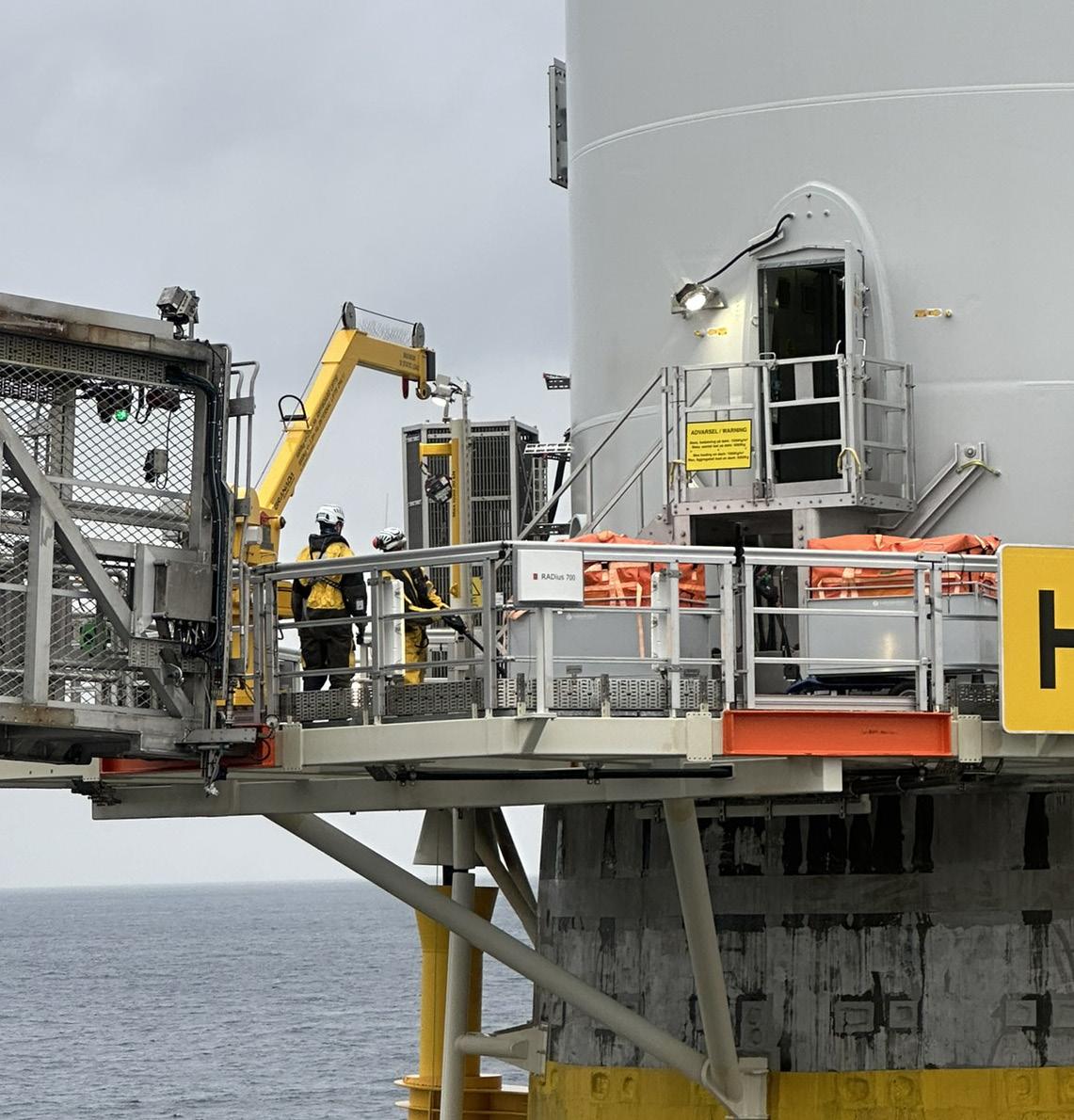
Based on a clear maker standardization strategy we have developed vessels with unique capabilities targeting attractive niche markets.
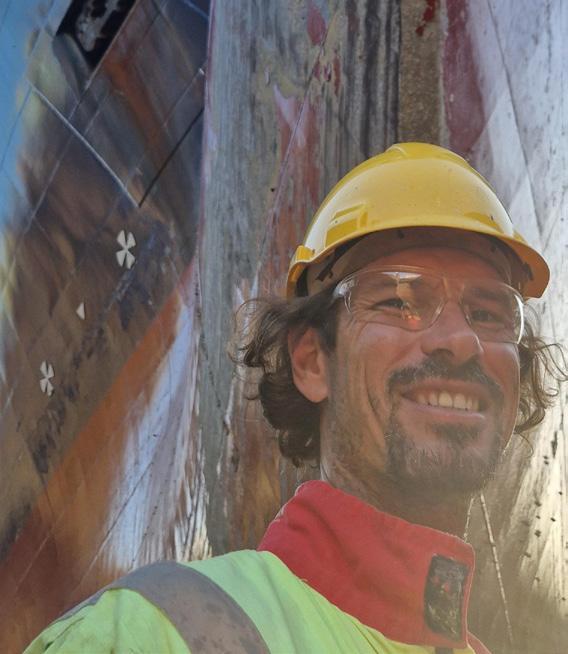
A strong safety culture is key to high quality and safe performance.
Management Message
Our business is intertwined with Environmental, Social and Governance concerns. A strong ESG proposition that can create stakeholder value therefore makes sense. A strong regulatory push, higher society attention and extensive research showing a clear link to business performance underline the need for a convincing ESG strategy.
Island Offshore has a distinct objective to maintain and operate its fleet in accordance with national and international laws and regulations, in particular with respect to Health, Safety and Environmental issues.
In the last five years we have invested significantly in hybrid battery systems, shore power and other emission reduction initiatives to continue emission reduction efforts. We have also explored biogas, biodiesel and ammonia as alternative maritime fuels through feasibility studies and research.
Our main objective is Safe and Sustainable operations in order to create value for stakeholders including owners, customers, employees and the society overall.
A strong Environmental, Social and Governance policy will add business value by boosting sales and reduce operating costs and business risk.
Our employees have made an impressive contribution to reducing the use of fuel thus the CO2 footprint by developing best practice and sharing experiences on how to operate the vessels efficiently. We estimate that reductions of 2535% have been achieved compared to 2010 as baseline. In the last five years we have invested significantly in hybrid battery systems, shore power and other emission reduction initiatives to continue emission reduction efforts. We have also explored biogas, biodiesel and ammonia as alternative maritime fuels through feasibility studies and research. Pending technology approval and improved availability of new maritime fuels, our main priority will be to reduce energy use in all aspects of our operation.
We plan to continue our efforts and invest in new technologies as these mature, however the authorities and operators must contribute to reduce risk by co-investing in technology and differentiate low emission vessels. Continuing to promote behavioral improvement through learning and sharing best practice will also continue in close tandem with digitalization efforts. More and better data will enable improved understanding and decision support that ultimately will reduce environmental impact.
Our ESG reporting is still in its infancy but Island Offshore shall strive to be aligned with industry practice and regulatory requirements for sustainability reporting. Our reporting shall outline clear and material targets, performance, and relevant governance information on how material issues are managed.
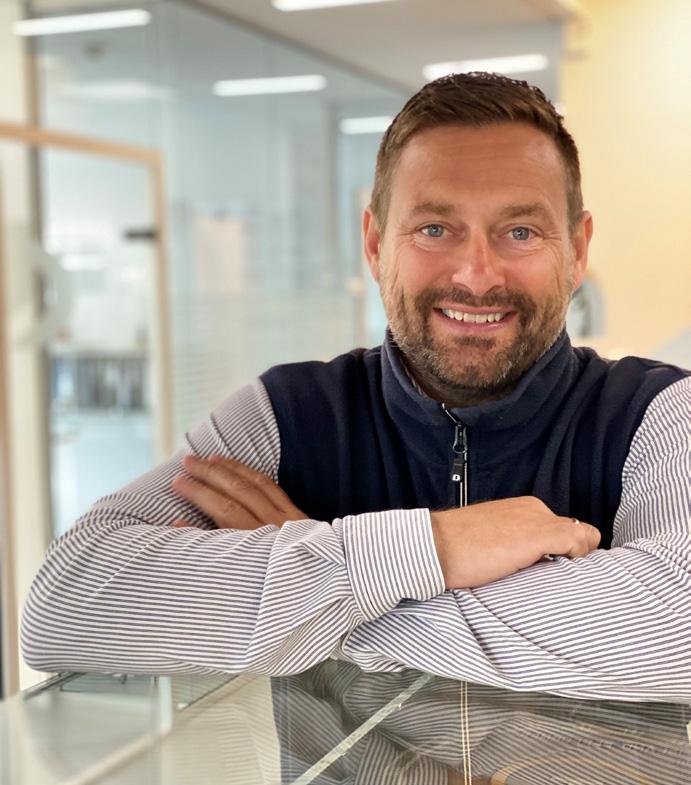
Tommy Walaunet, Managing Director
The Island Offshore Group
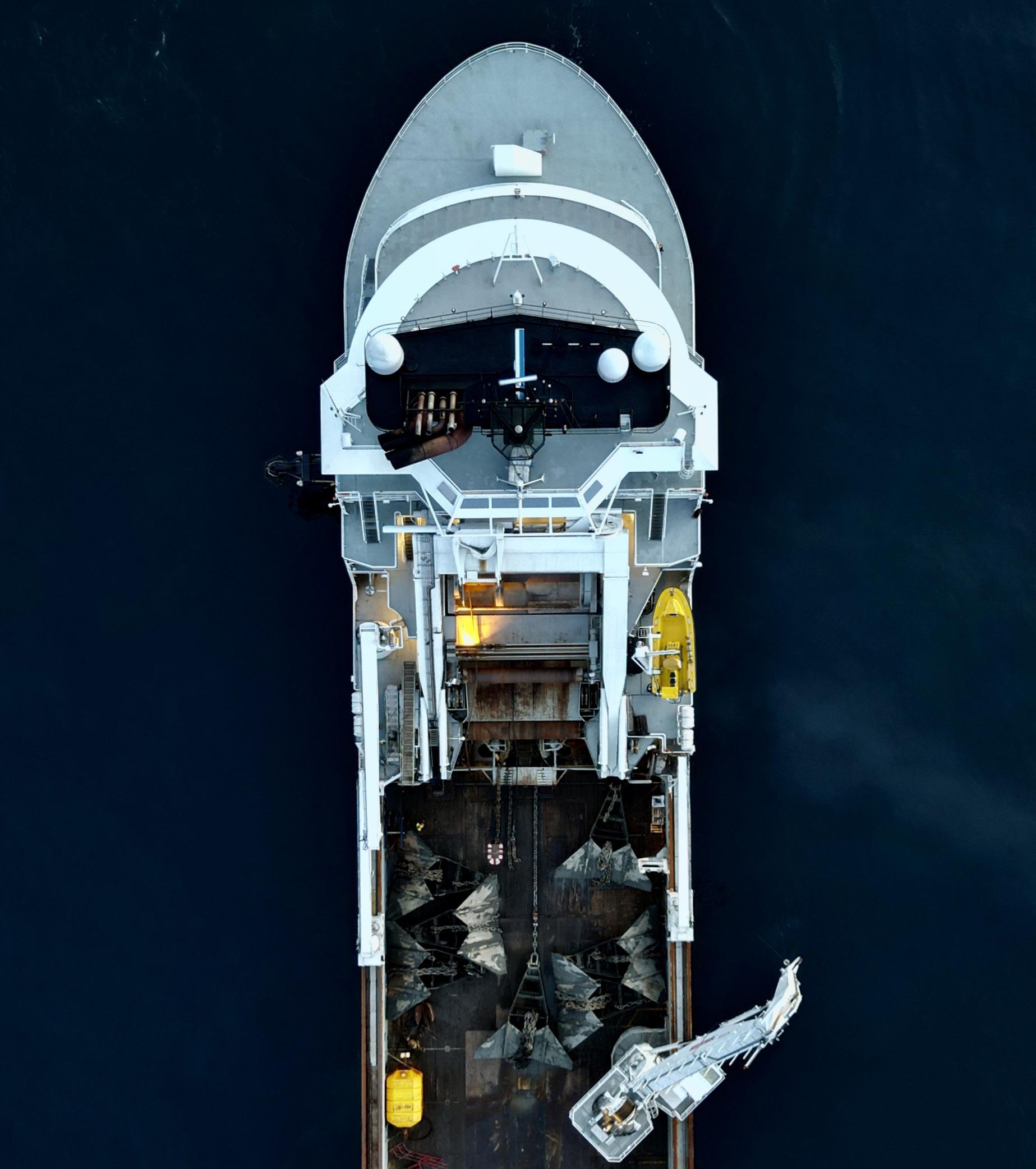
Based on a clear maker standardization strategy we have developed vessels with unique capabilities targeting attractive niche markets.
Island Offshore is a private group that owns and operates 20 OSV vessels that sail under the NOR and NIS flags. The market segments include vessels that work in well intervention, supply, anchor handling, subsea construction, walk-to-work, and well stimulation. The company has approximately 900 employees, of which 850 are sailing personnel. The head office is located in Ulsteinvik, Norway. The vessels work globally, with most activity in the North Sea.
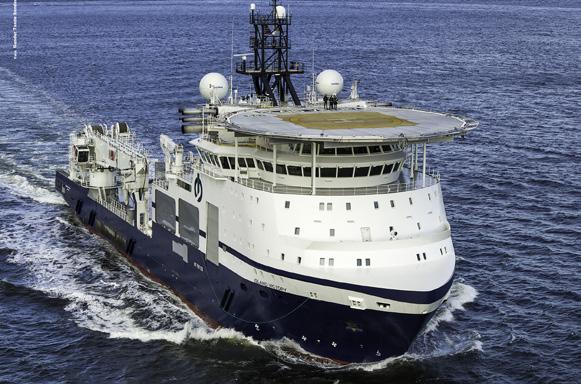
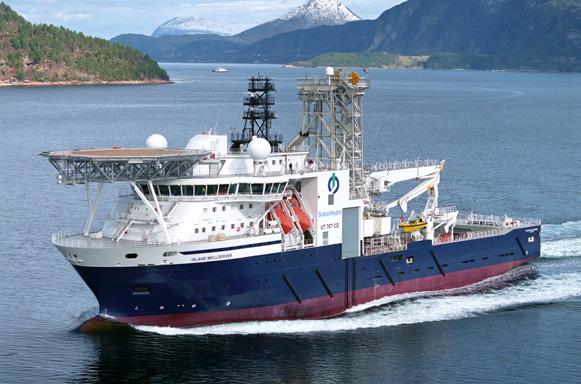

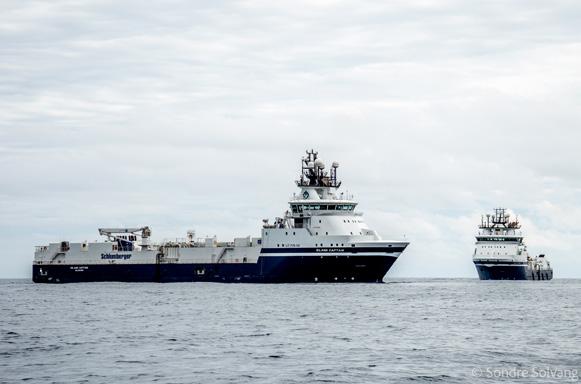


Since its establishment, the company has chosen a standardization strategy for ship design and equipment manufacturers; based on this, it has developed vessels for attractive niche markets. We aim to be a preferred supplier of high-quality, advanced service vessels to the offshore and renewables market. Our main goal is safe and sustainable operation.
Our management system is maintained under the requirements and guidelines in the ISM code and the ISO standards ISO 9001 Quality and ISO 14001 Environment. In addition, the management system is covered by the requirement for an Acknowledgment of Compliance from the Petroleum Safety Authority for the operation of mobile offshore units. Furthermore, the system is subject to annual audit and supervision.
90,4%
WORKING HOURS
1.660.000
VESSELS IN OPERATION
20 AUDITS 259
6 SPILLS
LTI INCIDENTS
2
SAFETY OBS CARDS
15.759 OSV 40.602 LWI
CO2 EMISSION
154.000t
ESG Objectives
We acknowledge that our activities have an impact on the environment and society. Our strategic objective demonstrates our commitment to long-term sustainable value creation for owners, customers, employees and the society overall.




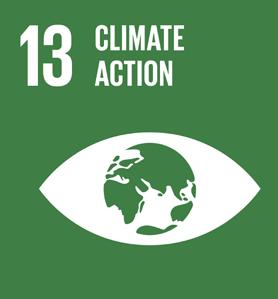
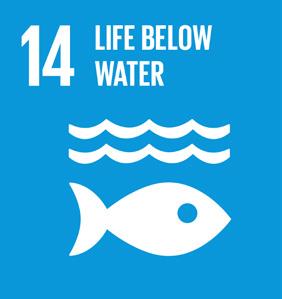
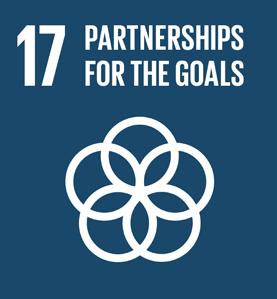
We support the principles of the United Nations’ Global Compact and the policies that advance the goals of the Paris Agreement. They shall act as a roadmap for all countries in the global effort for sustainable development towards 2030.
As a company, Island Offshore contribute to social and economic development in the communities we operate in by delivering value creative services, jobs and developing people. We support all the 17 Sustainable Development Goals but focus particularly on the goals presented above.
Island Offshore shall be aligned with industry practice and regulatory requirements for sustainability reporting. This includes regularly reporting safety, environmental, emission, and other essential ESG data. Our
reporting shall outline clear and material ESG targets, performance against those targets, and relevant governance information on how the company manages material issues.
We base our materiality assessment on the industry guidelines published the Norwegian Shipowners’ Association. A materiality assessment seeks to identify which ESG topics are material to report on, thus ensures that we disclose relevant and sufficient information. The assessment considers the level of materiality of a topic against two parameters:
1) impact on the company’s own value creation, and 2) impact on external stakeholders
Impacts on external stakeholders are usually identified through dialogues with stakeholders such as owners, customers, financial institutions, and civil society. Impacts on value creation is identified internally in the company through interviews with top management and surveys of key internal functions. It is important to include all levels of the organization, e.g. operational, management, and possibly board of directors, to map out where the risks and opportunities are. It is important to secure the independence and integrity of the process and for stakeholders to feel free to voice their opinions. The list of impacts is not exhaustive but reflects the most material issues relevant for our industry:
ENVIRONMENT:
• Emissions and energy reduction
• Biodiversity and marine pollution
SOCIAL:
• Health, safety and security
• Labour and human rights
GOVERNANCE:
• Anti-corruption
• Accountability and transparency
Environmental impact

Each year, we revise Shipboard Energy Efficiency Management plans for each vessel to enable continuous and effective implementation of energy efficiency practices. Priority measures are tailored to each vessel with focus on cost and benefit related to emission reduction potential.
Island Offshore is committed to implementing energy efficiency practices on all our vessels to deliver sustainable services to our customers. Each year, we revise Shipboard Energy Efficiency Management plans for each vessel to enable continuous and effective implementation of energy efficiency practices. Priority measures are tailored to each vessel with focus on cost and benefit related to emission reduction potential.
Our energy policy guidelines are not just a set of rules but a dynamic framework that we continuously revise to ensure we consume energy in the most efficient, economical, and environmentally responsible way possible. This proactive approach involves applying new technology and energy efficiency practices in all aspects of operation and providing comprehensive training for our personnel.
Our reporting procedures address GHG emissions and the ability to comply with climate-related regulations, including concerns over air pollution from ships (NOX, SOX, and PM) in harbour areas.
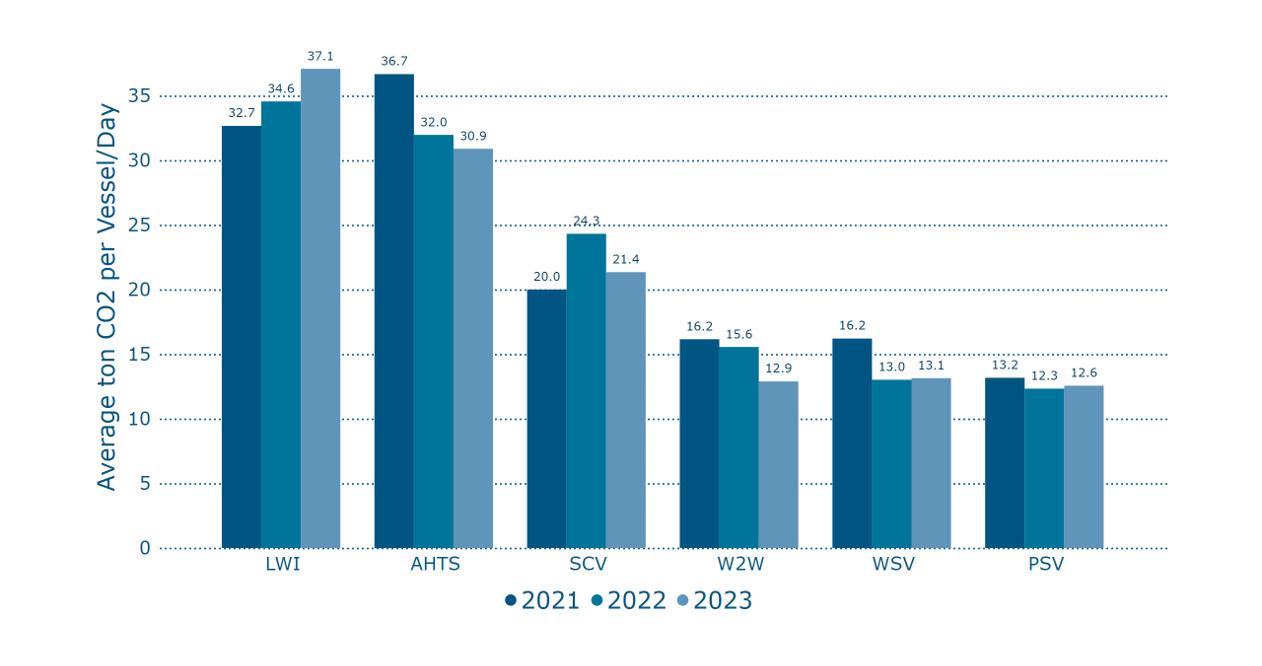
The average ton CO2 emitted is decreasing for all segments except LWI. The activity has increased for all segments, especially during winter months. As such, adjusting for operations productivity, emission intensity is decreasing for all segments.
Objectives
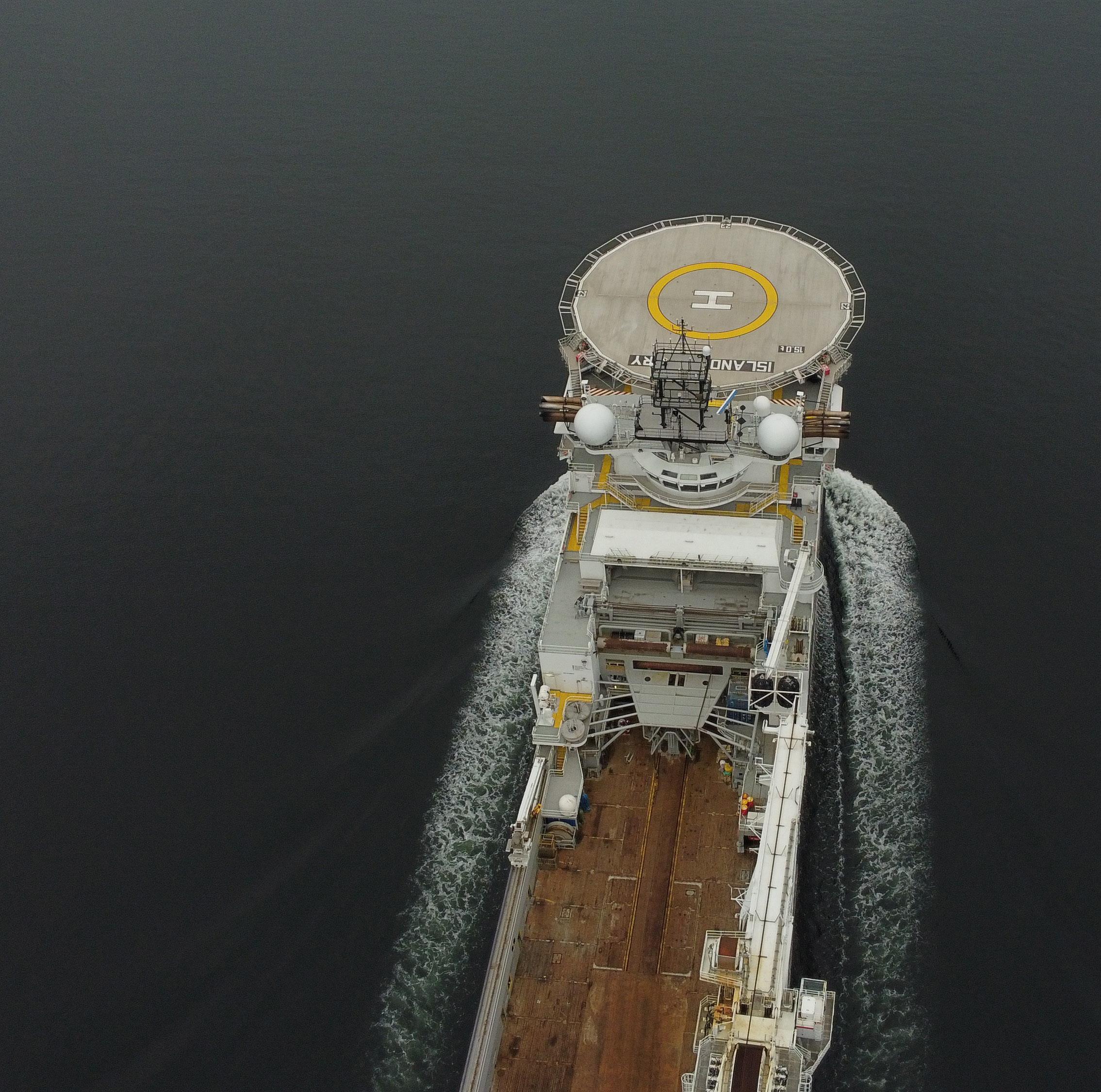
We are committed to protect the environment, and avoid harmful effects and waste from our

Island Offshore is committed to protecting the environment and avoiding the harmful effects of pollutants and waste from our activities. Our main objective is Safe & Sustainable, which demonstrates our commitment and desire to operate in a long-term sustainable manner.
Long-term objectives for emission reduction:
• To reduce average fleet CO2 emission by 50% in each operating mode by 2030 using 2010 as the starting reference.
• To implement a bridging strategy for existing vessels enabling introduction of retrofit technology for alternative fuels and electrification as these measures become mature and available with focus on reliability and affordability.
• To only order vessels with zero emission technology from 2030, targeting carbon neutrality in each project.
Reducing emissions
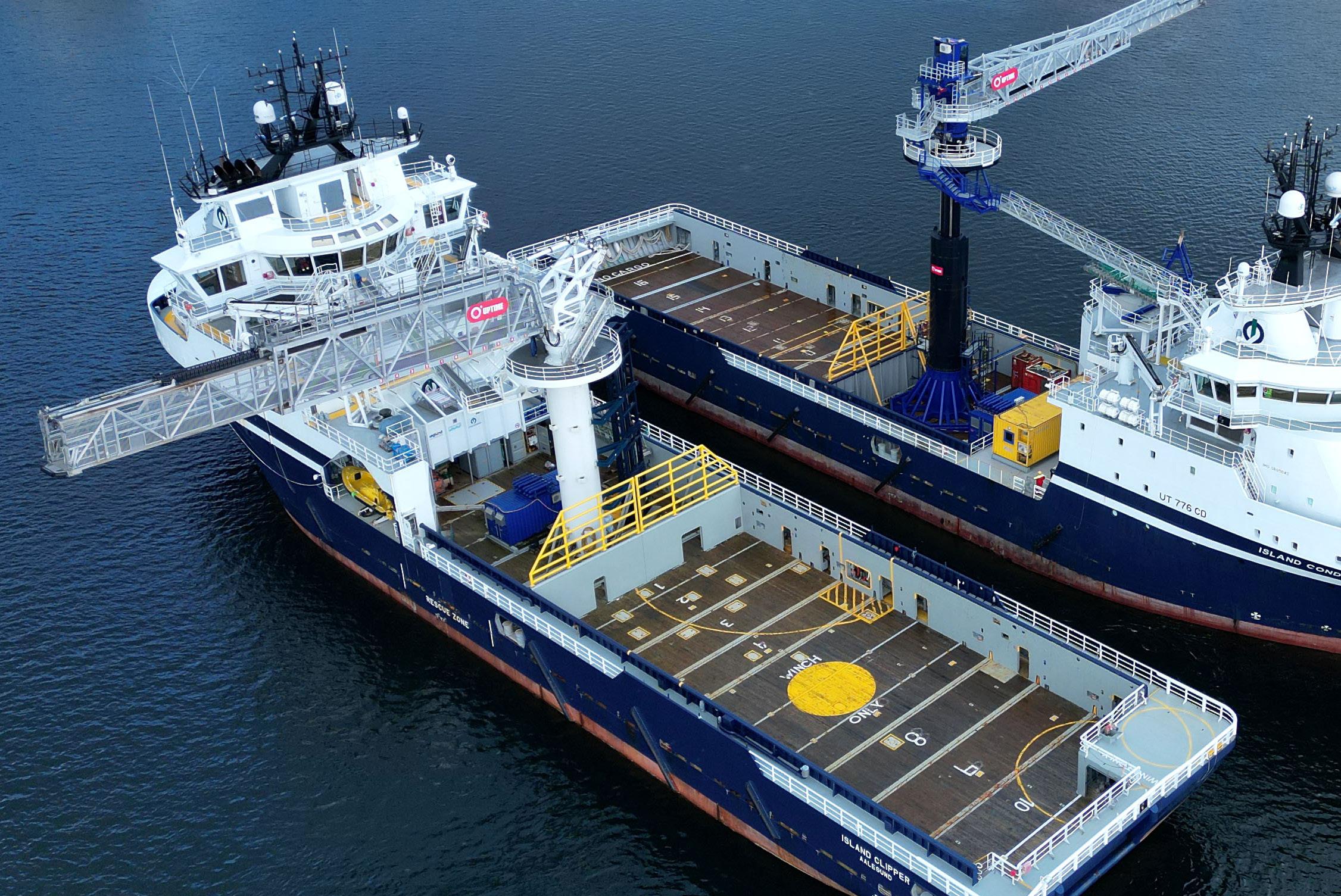
Our vessels run on marine gas oil (MGO) or liquified natural gas (LNG). Several vessels are fitted with selective catalytic reduction (SCR) plants to reduce NOx emissions. The generators fitted are compliant with tier II or tier III, according to MARPOL. Ultralow-sulphur fuel Oil is utilized for all vessels to reduce SOx emissions. Our primary focus is to reduce fuel consumption to reduce emissions further.


The climate and nature emergency is one of the most significant challenges of our time. The increasing frequency of extreme weather events and their substantial impact on people, the environment, and economies underline the urgency and the need to act.
The international community agrees that we must stay within the Paris Agreement 1.5dg global warming target to reduce impact. Significant reductions in GHG emissions are needed, targeting a 50% reduction by 2030 and net zero by 2050. This is in line with national and international targets.
Gradual phasing out fossil fuels and increasing access to alternative energy will be critical, especially for offshore shipping as a large consumer of fossil fuels.
Island Offshore acknowledges the need to achieve significant scope 1, 2, and 3 CHG reductions and has established a policy statement, objectives, and actions to support this goal.
Scope 1: Direct emissions from our vessels and vehicles
Scope 2: Indirect emissions from purchased energy in own operations and supply chain
Scope 3: Indirect emissions from use of Island Offshore services in the supply chain
The transition to reduced and net zero emissions must be reliable, affordable, and sustainable, as well as ensure vessels’ safe and reliable operation.
Based on review of internal data, we estimate that average fuel consumption thus CO2 emission from our fleet has been reduced by approximately 30% since 2010. This has been achieved through an increased focus on efficient operations, improved hull design, diesel electrical propulsion and retrofitting battery packages and shore based power systems.
A total of five vessels have battery packages installed – one more installation is planned for 2024; in total nine vessels will then also have shore power systems. SCR systems to reduce Nox emission on are installed on a total of fifteen vessels. Biogas trials on our LNG powered vessels have also been successful thus providing a zero emission alternative but at a significantly higher cost for the operator. Engine makers are now increasingly confirming that retrofit technology can be applied on existing engines to enable readiness for alternative fuel.
In our experience, introduction of alternative low, or zero, emission fuels will require a significant cost compensation to be successful in replacing conventional fuel.
How to reduce emission?
Manage risk
• Systematically monitor and manage hazards and exposure from vessel operations
• Ensure compliance with international law and regulation and commitment to stated goals
• Use SEEMP process to facilitate improvements and set objectives for each vessel
• Ensure vessel capex programs provide capacity to invest in emission reduction solutions
• Maintain best practice emergency preparedness procedures to reduce incident impact
Optimize operations
• Work to systematically optimize machinery and systems, propulsion and vessel hydrodynamics. Use big data analysis to identify priority improvements
• To challenge and continuously improve good seamanship by learning and experience sharing
• Vessel-by-vessel bridging strategy to employ new technology and alternative fuel solutions as these mature, but always with focus on reliability and affordability
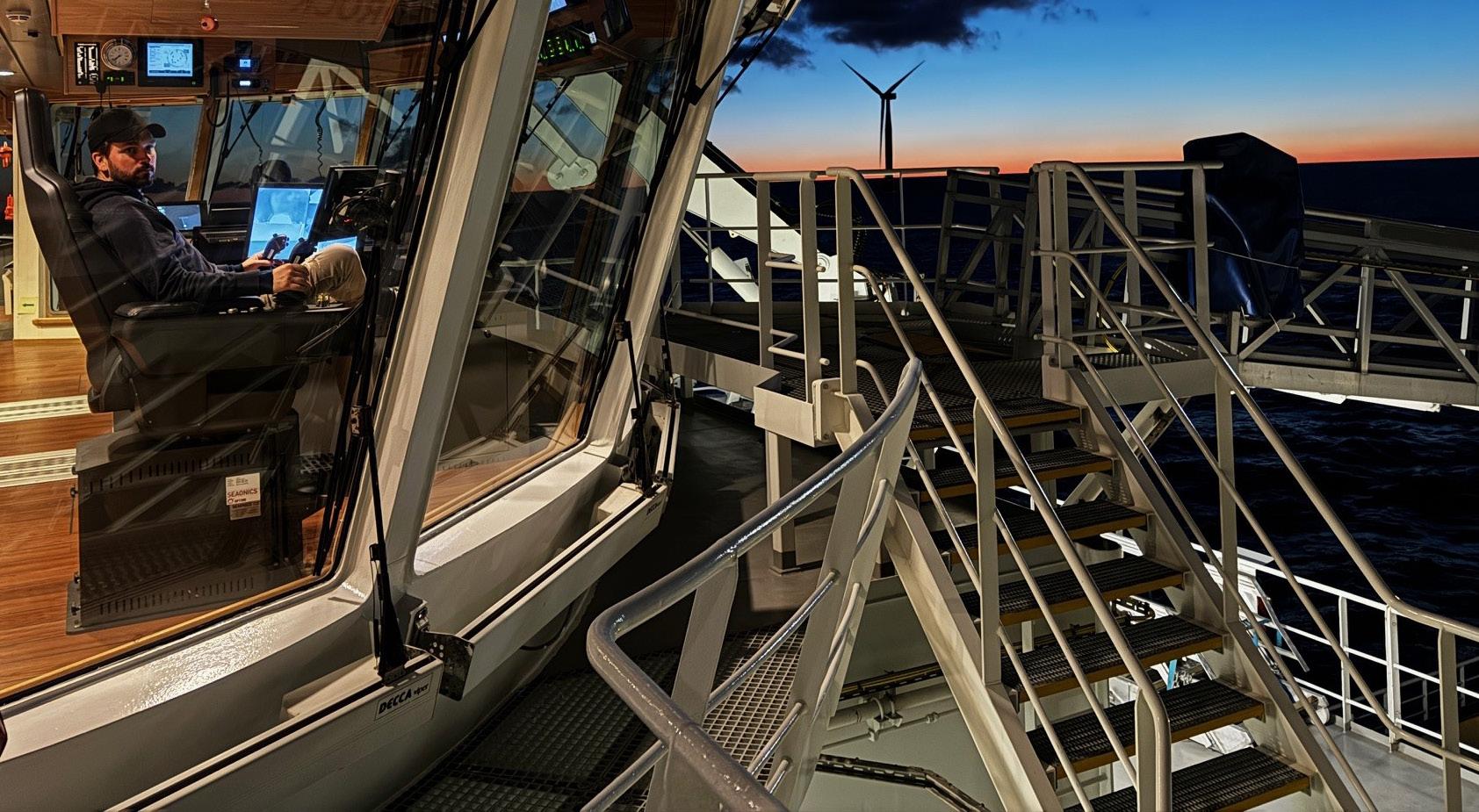
Carbon intensity per operation mode (SEEMP) - We experience reduction for all type of operation modes:
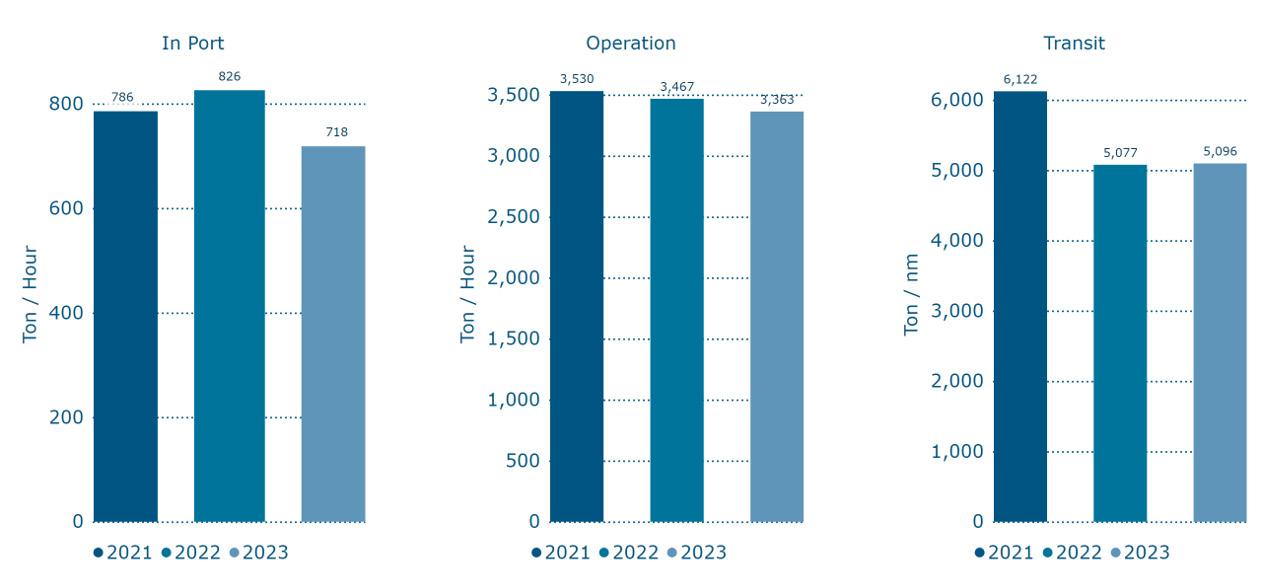
Going forward our efforts focus on using digital monitoring and analysis to enhance knowledge and understanding of energy efficiency. All vessels are now equipped with data capture systems and monitoring devices that enable such analysis.
Further, we are involved in industry collaboration studies to explore ammonia as a future fuel, as well as data modelling studies to optimize operations, equipment and hull/propeller cleaning.
Average emitted CO2 per vessel is still decreasing even after selling several of the smallest vessels:
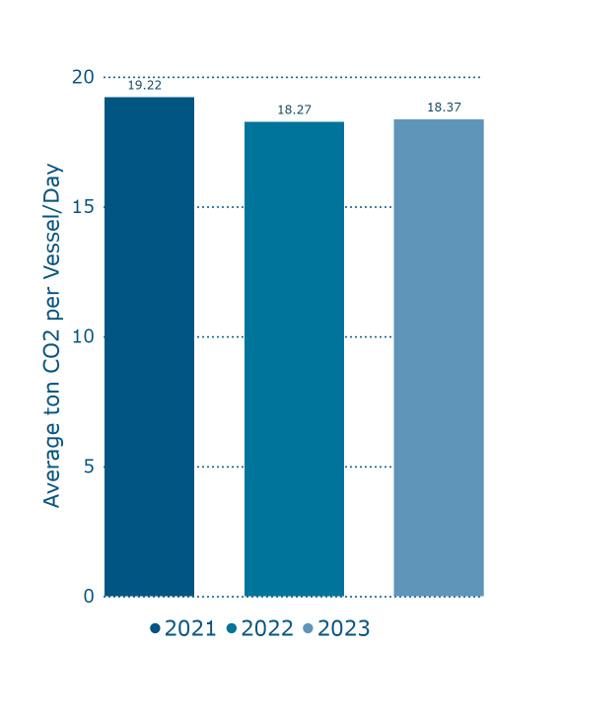
Environmental aspects
We are constantly striving to reduce our impact on the environment. By knowing and controlling the environmental aspects identified for our company’s activities, we are controlling the environmental risks associated with our actions, thus providing good risk assessment and management for the areas where our company processes can impact the environment:
• Use of energy, raw material and natural resources
• Emission to air
• Discharge to sea
• Waste and waste treatment
• Discharge to ground
handling
Purchase
proper paint/ chemical handling system onboard and delivery to certified vendor.
Purchase of environmental friendly chemicals/paint
of environmentally focused reception facilities
proper waste handling system onboard and selection of vendors certified to receive special waste
proper LSA scale waste handling system onboard and selection of vendors certified to receive radioactive waste
proper waste handling system onboard and selection of vendors certified to receive special waste
proper paint/ chemical handling system onboard and delivery to certified vendor. Purchase of environmental friendly chemicals/paint
agreements are in place and delivery to appropriate instance
Change to improve
Island Offshore is continuously working to limit and reduce emissions to both sea and air. Its clear ambition is to reduce CO2 emissions by 50% in each operating mode by 2030. There is a strong correlation between emissions to air and fuel consumption.
In the last couple of years, Island Offshore has introduced new technologies to reduce emissions, lowering fuel consumption and costs for both us and our clients.
Battery packs have been installed on five vessels, with an additional installation planned for 2024. The ESS system is used as spare capacity and extra safety when the vessel is alongside a rig, thus saving fuel and generator running hours. In addition, the battery will contribute with quick and effective power during transit, reducing the need to start up an extra generator for peak loads. Two of our platform supply vessels also run on Liquid Natural Gas, making the combination ideal, as gas engines perform best when running on constant load. In 2023, we have received confirmation from our preferred engine maker that current engines will be ready for the introduction of methanol. Positive tests with a blend of hydrogen have also been completed in 2023.
Eight of our vessels have shore power connections, eliminating emissions when connected at the port. Emission reductions from these systems vary due to the availability of connections, especially in the UK and Denmark.
In 2021 Island Crusader was the first vessel on the Norwegian continental shelf to run on biofuel, resulting in immediate and significant reductions in CO2 emissions. In collaboration with Lundin Energy Norway, this pilot also proved that biogas can be used on LNG engines without any modifications. The biogas used on Island Crusader is produced from cow manure and fish and wood processing waste. It consists mainly of methane; however, CO2 and water are formed upon combustion. Since the raw material comes from biological material, the combustion is calculated as CO2-neutral as it enters the natural CO2 cycle. There is no net increase in the CO2 level in the atmosphere.
The process of digitizing our fleet by installing the data collection solution Vessel Insight and Vessel Performance monitoring system is progressing. This will enable us to use advanced decision-support tools and benchmark our vessels by comparing operational data from all vessels to reduce fuel consumption and emissions, as well as automate reporting processes.
Focusing on continuous improvement, all our vessels have their individually adapted Ship Energy Efficiency Management Plan (SEEMP) to better plan energy efficient operations. Familiarization and training of personnel play a key role in this.
It is all about using the brain while using muscles! Small changes of habits give a huge contribution in saving fuel for our contractors, as well as saving the environment due to reduced hours of engine operation.
Ecological impact
Biodiversity and marine pollution concerns the transfer of invasive species through ballast water, impact on marine life from anti-fouling chemicals, insufficient on-board waste management, spills and responsible environmental practices for newbuilds and ship recycling practices.
In Island Offshore we have ballast water treatment systems installed on all our vessels, to eliminate the risk of transporting unwanted organisms into new waters.
Waste handling
Waste segregation in Island Offshore is based on segregation requirements in MARPOL.
All waste is segregated onboard prior to delivery to shore based facility. Alternatively the waste is disposed at sea using approved methods like type approved incinerator, food macerator or approved sewage treatment plant.

Spills to environment
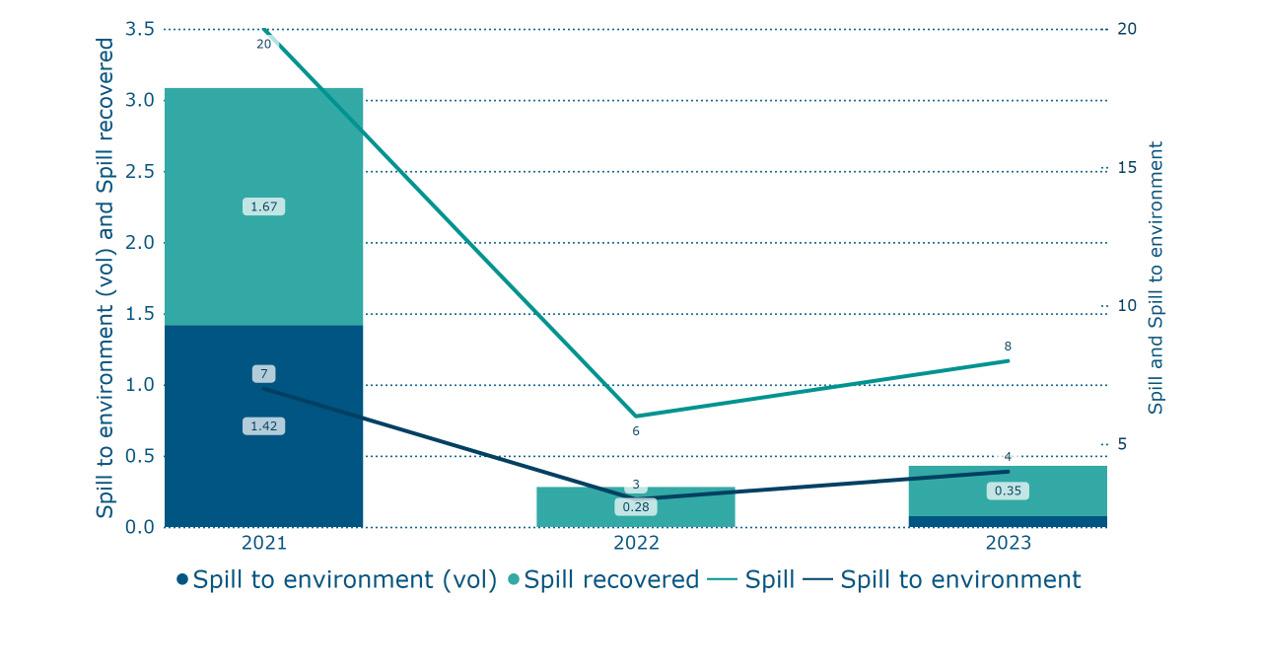
Discharge to external environment
Goal: 0
Discharge to external environment is measured by number of discharges per million workhours. During 2023 there were in total 4 cases where in total 76 liters of hydraulic oil was spilled to sea and not recovered. All three cases involved equipment which is placed in the sea or above sea. Our goal is to have no such discharge.
Standards and regulations
We comply with all applicable legislation and regulations regarding our ISO 14001 and ISO 9001 certification.
Social impact
- Objectives
• We are committed to ensure a high level of safety involvement of all employees. By promoting and maintaining a safe and healthy working environment we aim to avoid accidents and harm to people. Monitoring employees and hired workers’ HSE practices and injury frequency rates are important concerns.
• Compliance with labour and human rights standards is important to support worker’s rights. Monitoring and reporting include description of policies and approaches to labour and human rights for employees and contracted workers in the value chain.
• Inequality within and among countries persist and has been reinforced during the pandemic. The most vulnerable groups are hit hardest therefore need our support and solidarity. We must adopt policies and business strategies that promote equality.
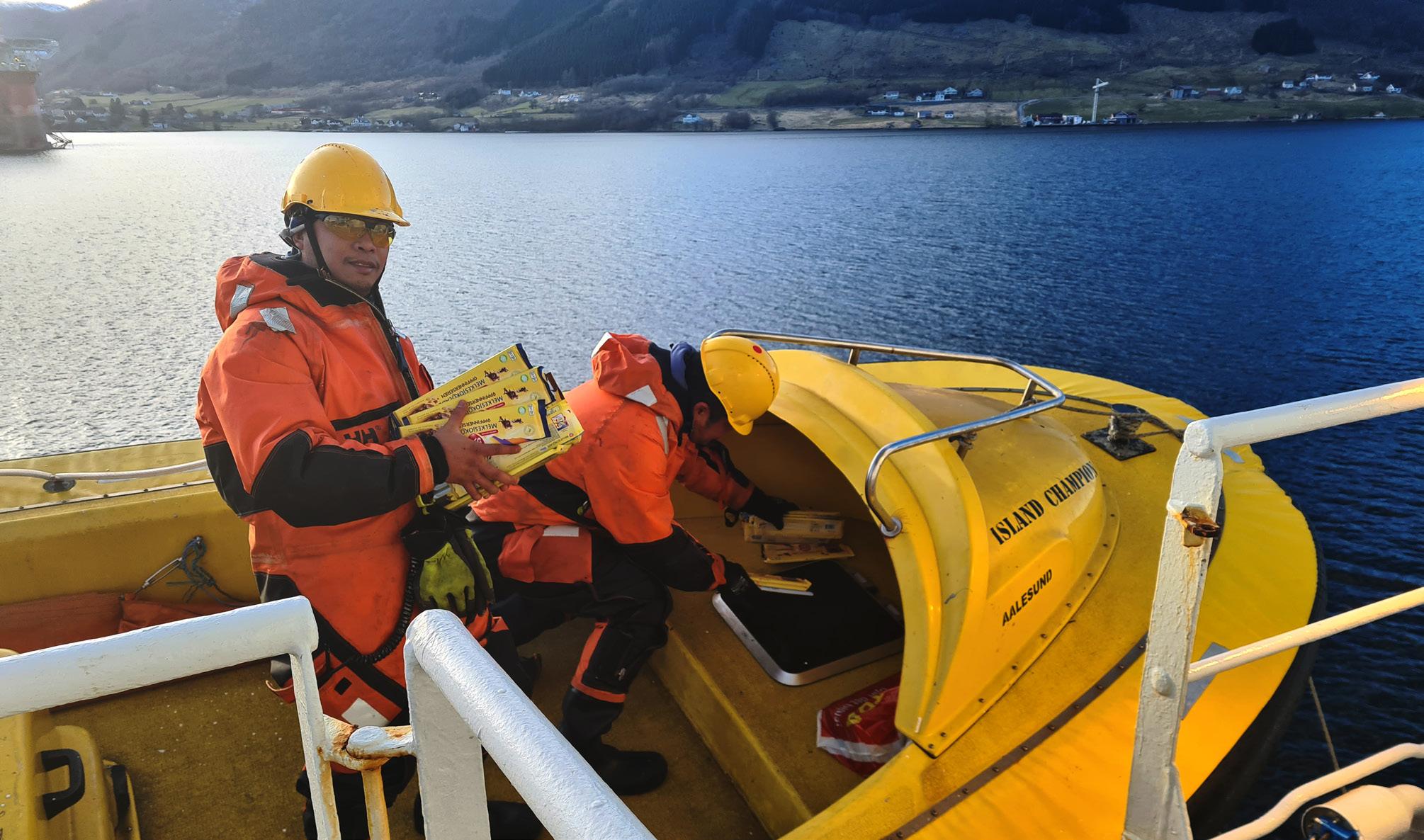
Human rights

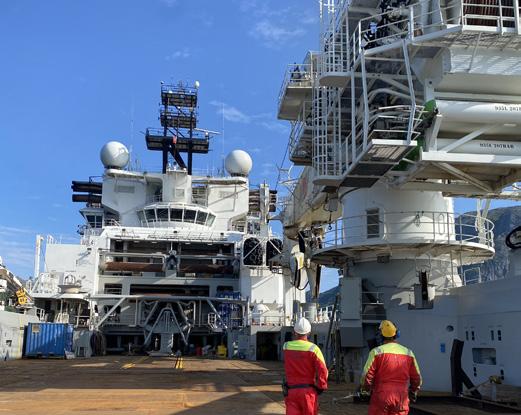
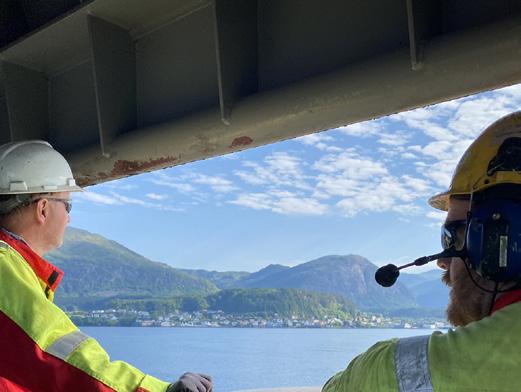
We shall treat one another with openness, respect and honesty and make sure all parties comply with our high ethical standards and code of conduct.
Island Offshore promotes respect for basic human rights and decent working conditions in connection with our vessel operations. This work impacts many of our stakeholders including those who can be adversely affected by our business.
We base our due diligence on recommendations and guidance issued by the Norwegian Consumer Protection Authority, hereto the OECD Guidelines for Multinational Enterprises and the accompanying guide for due diligence.
The essential pillars of this work are:
Ensuring corporate responsibility is implemented in our work procedures and Safety Management System.
Mapping and assessing potential negative impact from our activities including our value chain and business relations.
Implementing actions to prevent, mitigate or reduce negative impact.
Monitor execution and results.
Communicate how we work.
Follow-up rectification where applicable.
The Island Offshore Code of Conduct is designed to promote accountability and give guidance on our standards to employees and other stakeholders.
Island Offshore is committed to respecting and protecting internationally recognized human and labour rights, such as the UN Guiding Principles on Business and Human Rights (UNGP), International Bill of Human Rights and the ILO Declaration on Fundamental Principles and Rights at Work.
As a member of the Norwegian Shipowners Association, we are committed to make use of their Collaboration bargain agreements. These agreements are according to International Chamber of Shipping and International Transport Worker’s Federation (ITF). We aim to have a good relationship with the union representatives in the company and regular meetings are arranged.
The company is certified in compliance with Maritime Labour Conventions (MLC) which set the standards for the employment of maritime personnel. The purpose of the MLC is to provide decent working and living conditions for seafarers.
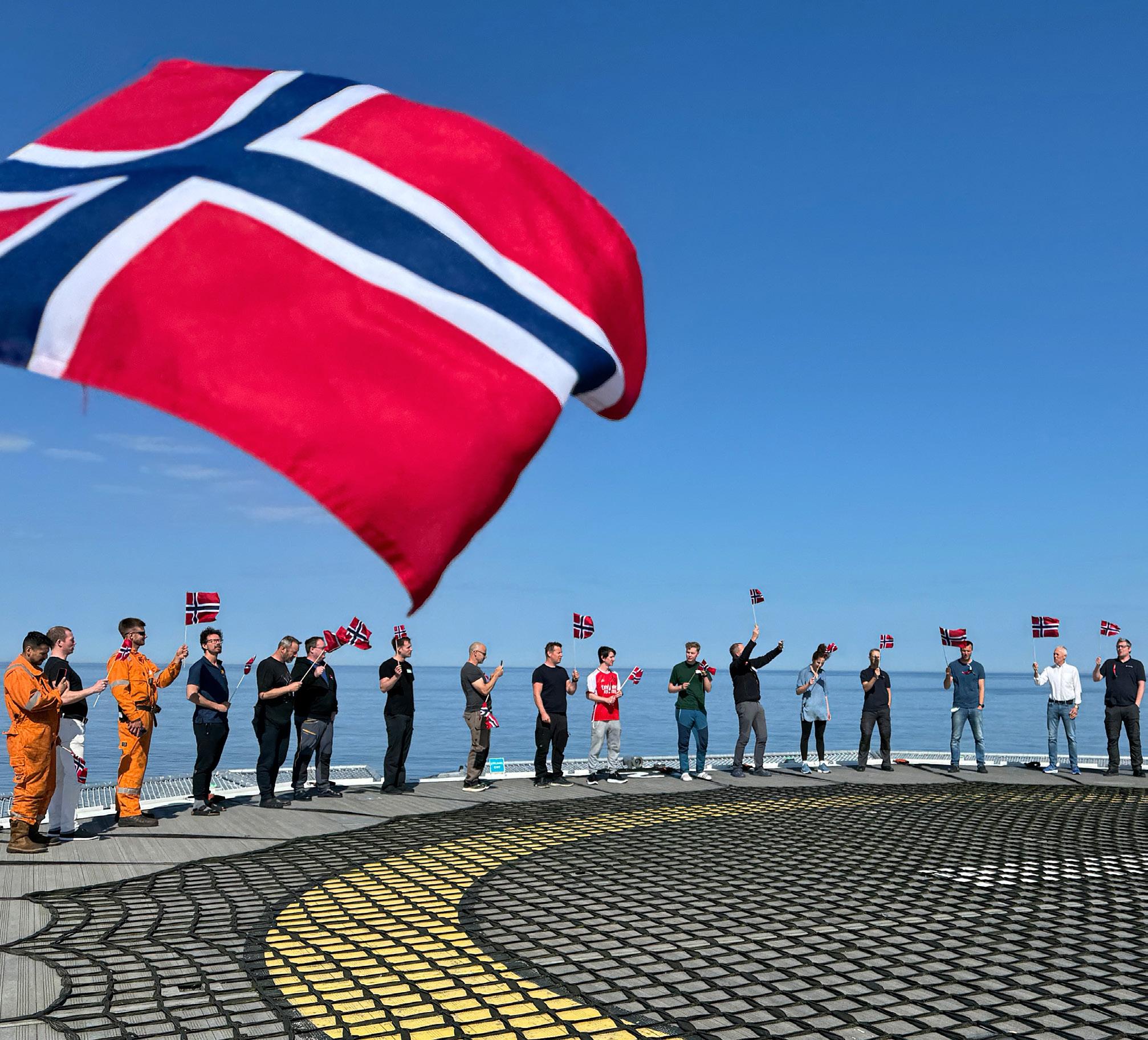
Health and safety
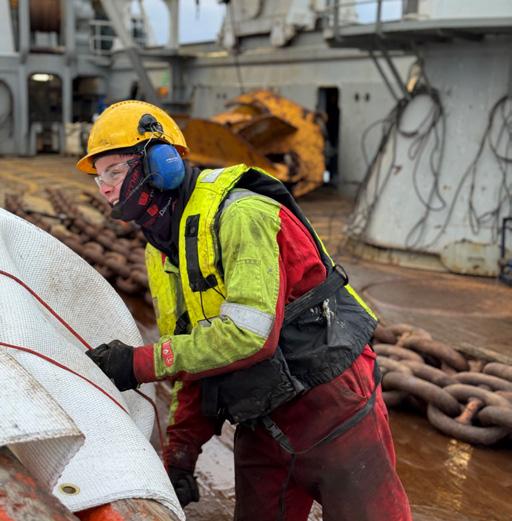
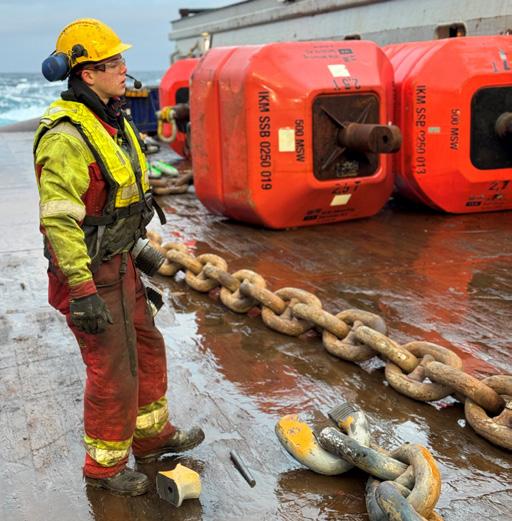

Safety shall always come first. When visiting our vessels, you are required to comply with our HSE standards.
We do not compromise health, safety and the environment, and we take our obligation to prevent and reduce potential consequences of our operation seriously.
In Island Offshore we believe in in-house and on-the-job training and coaching to develop a strong safety culture. Our goal is that each and every one is their own safety coach.
Our employees are trained for the tasks they are expected to complete and they are all encouraged to intervene or stop the job should they observe an unsafe situation or feel it is unsafe to continue their task. This includes the operation of subcontractors.
Our KPI, “Personal injury frequency,” measures the number of injuries more severe than first aid per million work hours. Our goal is that every worker come home in the same condition as when leaving for work. In previous years, we have seen a rise in the frequency. Based on analysis, dedicated measures have been put in place to reverse the trend. Last year, we saw a steady decline in the frequency; however, we are still not at our target.

QHSE goals for 2024
Quality: Non-conformance per authority audit
<1,0
Health: Sick leave offshore < 4,5%
Safety: Personnel Injury Frequency <2,0%
Environment: Zero discharge to environment
CO2 emission reduction: Port 3%
Steaming 3%
Operation 3%
Proactive reporting
Goal: 90%
2023: Q1 88 | Q2 88 | Q3 90 | Q4 90
Proactive reporting is measured as the fraction of proactive safety observations and safety conversations from the total number of observations and conversations. We have seen a good increase in the level of reporting as the share of proactive reporting has increased.
We are now at our goal of 90 per cent proactive reporting. Reporting is one process that enables the organization to learn continuously.
Dropped object rate (>40 joule)
Goal: 1.0
Q1
The dropped object rate is measured as the number of dropped objects above 40 Joule energy per million work hours. The frequency is relatively stable despite good efforts to reduce the number of cases.
Measures include independent inspections of DROPS prevention measures, a visualized inspection checklist, and cross-department inspections.
Our People
We embrace the diversity of our team members, stakeholders, and customers, including their unique backgrounds, experiences, thoughts, and talents. Everyone is valued and appreciated for their distinct contributions to the growth and sustainability of our business.
Island Offshore believes that creating a diverse and inclusive working environment where all employees feel valued and have equal career opportunities is not only the right thing to do but financially beneficial for our business. Our ambition is to have highly qualified employees that can execute our strategy and deliver high quality services.
Our priorities in this area include:
• High focus on retaining and developing employees by increased competence offering and strong Work Environment focus.
• Ensure high quality leadership in all levels of the organization, both onshore and offshore. Initiate next level leadership training.
• Securing an inclusive and safe working environment for all.
• Maintaining a dynamic apprentice program through the availability of a wide range of trainee and cadet positions.
• Supporting competence development through a combination of formal training, on the job training and own initiative.
Throughout 2023, we have also focused on improving our internal communication channels as we believe this is an important part of employee engagement. We have continued a weekly townhall Teamscall for offisers every Friday hosted by the Managing Director, and a weekly copious newsletter called “My Island”; with information, pictures and stories to and from the fleet. Ongoing work environment surveys in the fleet, ensures that we are on the right track.
The KPI “Employee satisfaction” is measured using the tool Questalyze. It uses QPS Nordic to map the company’s psychosocial working environment. Surveys are completed at regular intervals for all work locations. Results from the surveys are now at the same level as before the significant downturn after 2015 and well within the goal for this KPI.
Employee satisfaction indicator
Goal: 60-80%
2023: Q1 -- | Q2 67 | Q3 67 | Q4 69
Sick leave offshore (total)
Sick leave onshore (total)

Diversity
We consider it a competitive advantage to have a diverse team. We do not discriminate in hiring, compensation, access to training, promotion, termination, or retirement based on race, caste, national origin, religion, age, disability, gender, marital status, sexual orientation, union membership or political affiliation.
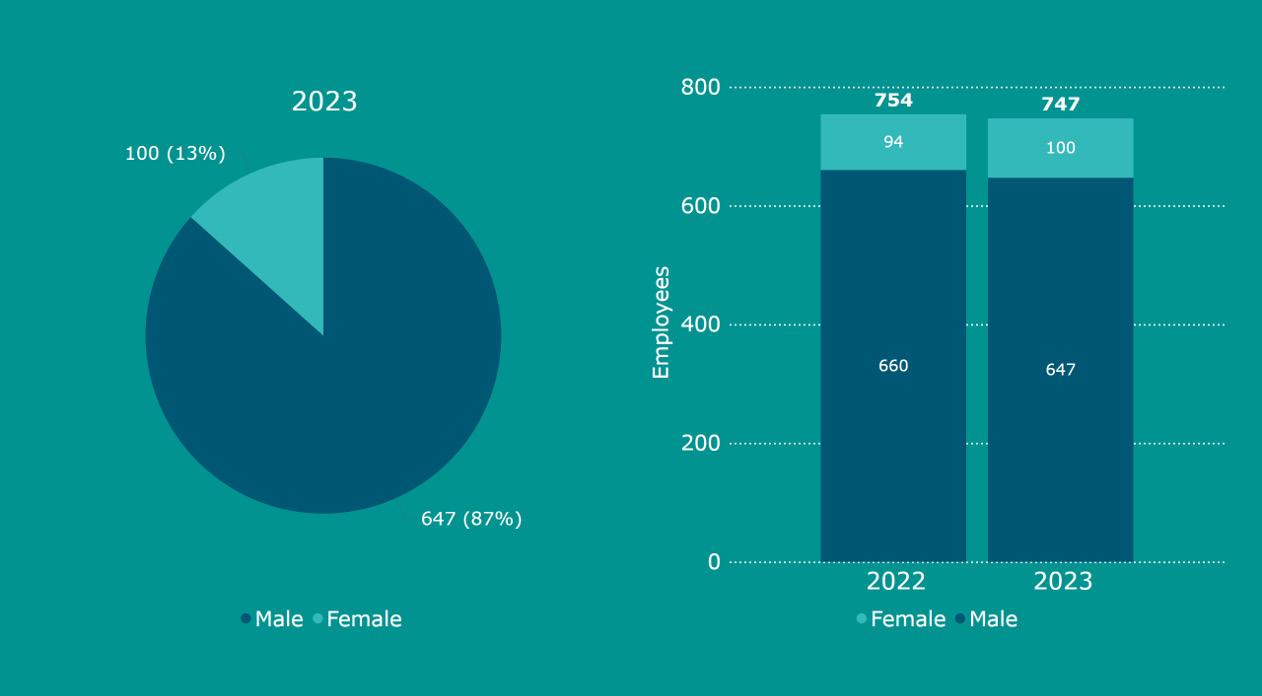
Most of our workforce is Norwegian, but we also have employees from Sweden, Denmark, the Faroe Islands and Finland. In addition we have crew members from Spain, Romania, Poland, Latvia and Lithuania employeed by our crewing department in Lisbon, Portugal. Finally, we also have an agreement with crew agent Stödig and OSM who we rely on for temporary crewing services from Europe and the Philippines.
A key part of our strategy to ensure the future success of our business and the maritime industry is to attract young people. Therefore, we have set a goal that a minimum of 10% of the entire workforce should be trainees.
Men have typically dominated the shipping industry, especially offshore activity and maritime positions. This also applies to our organisation, where only 13% of employees are women, one per cent down from 2022. Onshore, however, we have good representation, with 46% women.
Although we aim to attract more women to our industry, this is a big challenge for all the ship-owning companies. Recruitment is on Island Offshore’s agenda in management meetings, internal company conferences, and dialogue with employee representatives. We are board members for Maritime Training and the Training Office for hotels and catering, where we work actively to map out how to recruit more women. We also support initiatives through the Norwegian Shipping Association.

Island Offshore is active in the recruitment of apprentices and directs part of its activity towards highlighting the many career paths available to young women.
A central part of our strategy to ensure the future success of our business is to attract young people. The training offer is therefore essential. We aim to have between 30-40 training positions annually and have increased substantially in 2023 compared to 2022 with 49 versus 38 apprentices.
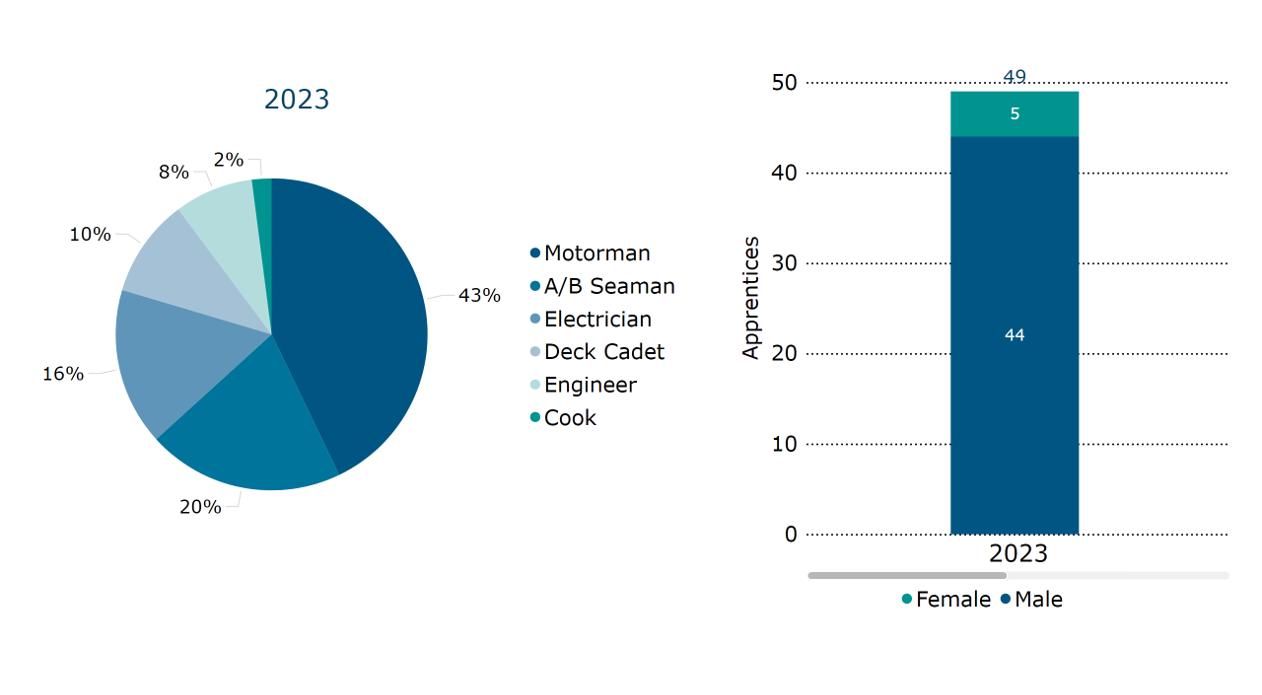

Senior Officer retention rate
Goal: < 90%
2023: Q1 90 | Q2 89 | Q3 89 | Q4 92
Our future
To secure future recruitment Island Offshore offers trainee positions in all departments on board our vessels.
New apprentices and cadets join our vessels every year to develop their skills to become able seamen, motormen, electricians or officers. Apprentices/cadets, is well taken care of, and a sought-after resource on board.
In addition we offer students the opportunity to spend time on board our vessels to get an impression of working as a seafarer.
We experience that many of our apprentices choose to come back to us after technical college or university, as working with Island Offshore has given them a great social experience as well as a solid technical background. This makes us proud!


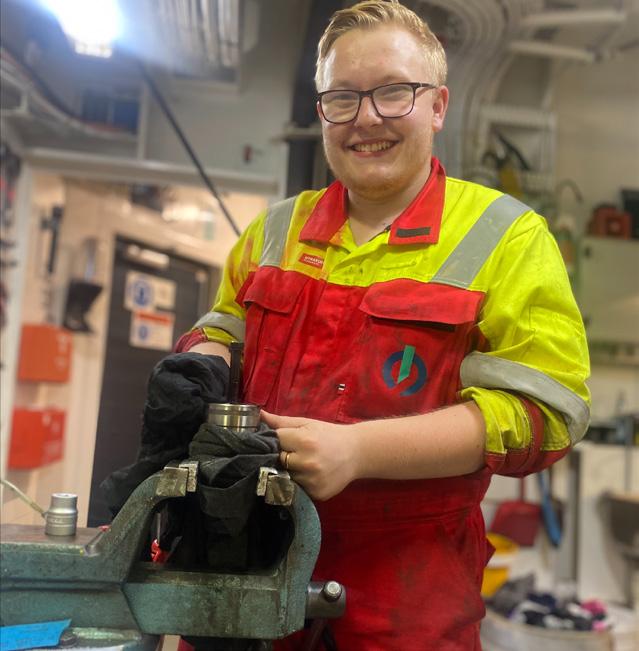
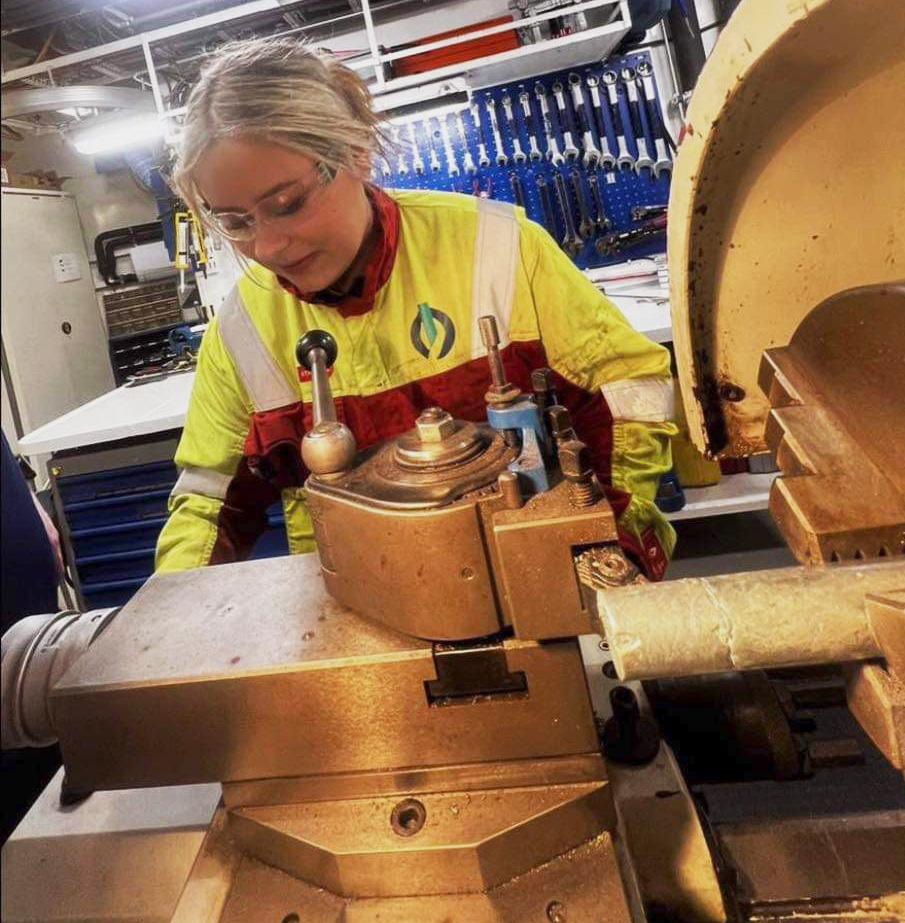
The Norwegian Transparency Act
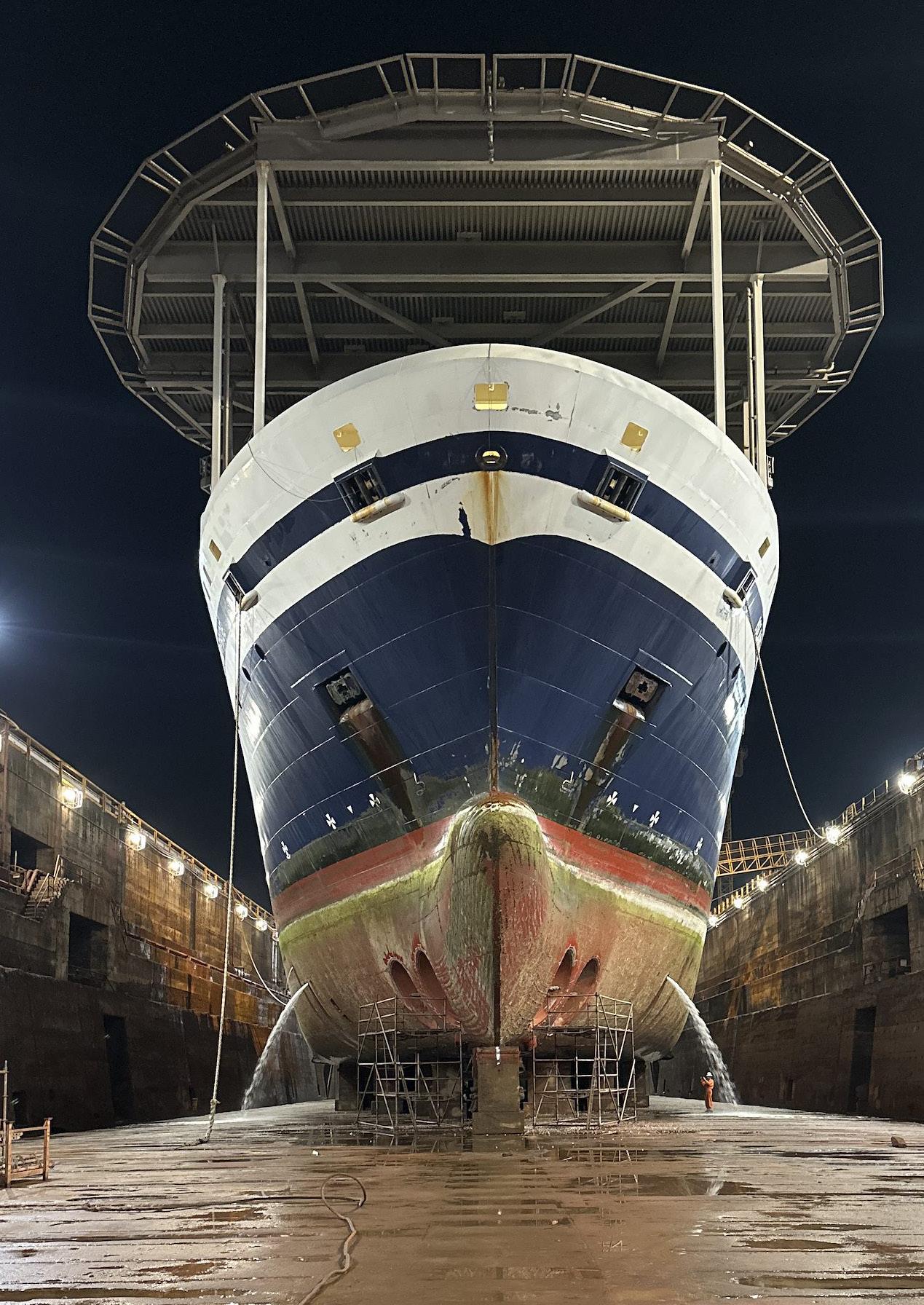
The Norwegian Transparency Act shall promote companies’ respect for fundamental human rights and decent working conditions in connection with the production of goods and the provision of services.
Any member of the public has the right to information about how businesses deal with negative consequences for fundamental human rights and decent working conditions, caused or contributed to by the company itself, or directly linked with the company’s operations or services via the supply chain or business partners.
All requests must be made in writing, addressed to: transparency@islandoffshore.com
Governance
- Objectives

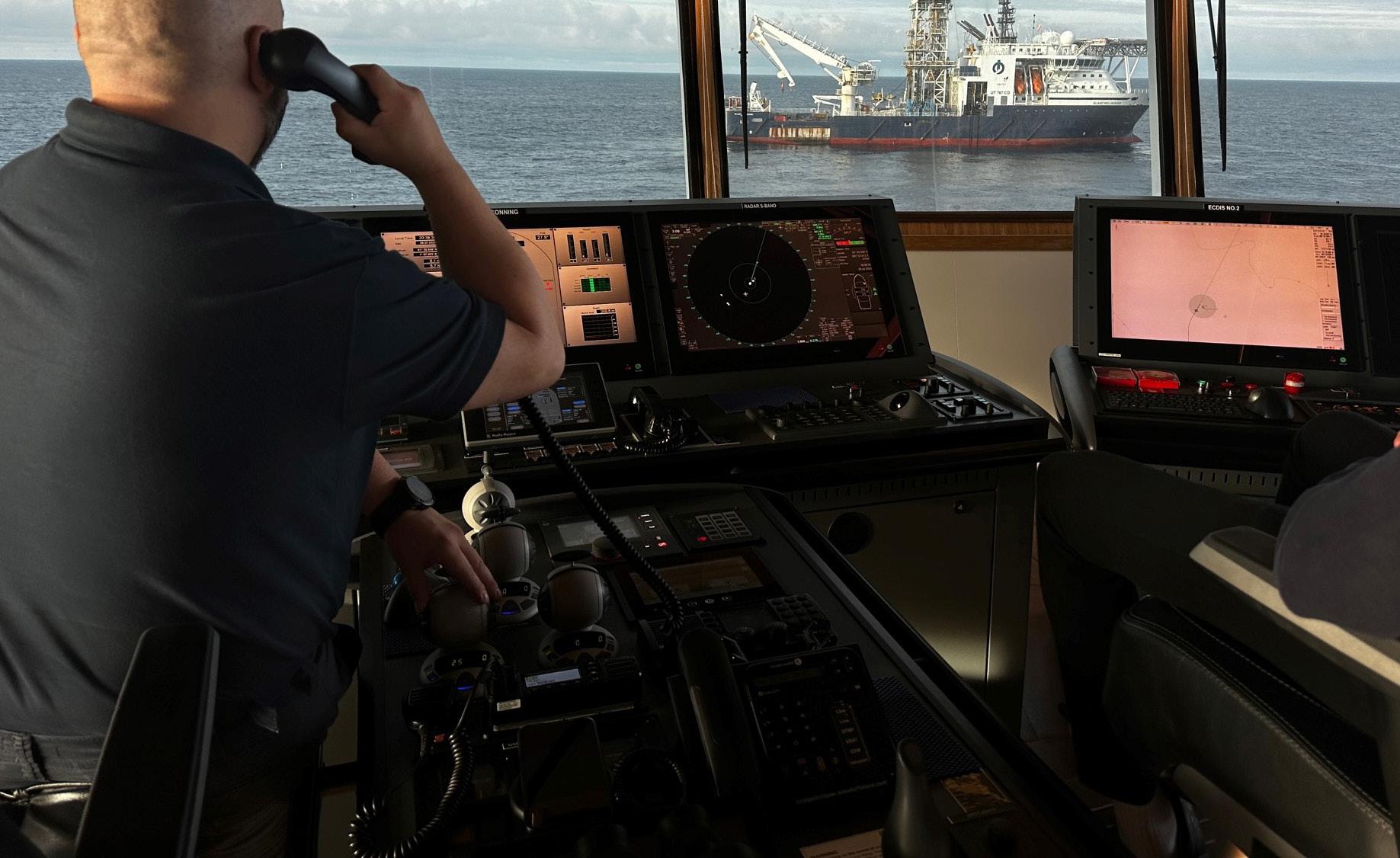
As a ship owner we have a distinct objective to maintain and operate our fleet in accordance with national and international laws and regulations, in particular with respect to Health, Safety and Environmental issues.
Our reporting explains how the governance structure safeguards compliance with legal requirements, potential sanctions and industry standards, and how the company ensures accountability and transparency in its operations.
Strong international partnerships are required to promote attainability of the Sustainability Development Goals. Shipping is international by nature. We contribute by supporting the international efforts of key shipping institutions such as The Norwegian Shipowner’s Association and IMO.
Island Offshore is fully
committed to comply with Norwegian law, international conventions and recommendations contributing to increase awareness of and prevent corruption activities. This is supported by our core values and business objectives, and our employees are committed to comply with this value statement and the ethical guidelines underpinning our business.
Island Offshore has a zero tolerance policy on corruption and breaches of this policy will imply disciplinary actions for our staff. Our leaders shall be aware of and understand our business exposure to corruption and bribery and shall inform our employees and monitor our business accordingly.
Further, our policies are implemented through employee introduction and training programs, purchasing procedures and market activities. Internal audit procedures shall also be adopted to verify compliance with our policies.



The number of Port State Control inspections and deficiencies and the rate of deficiencies per inspection:
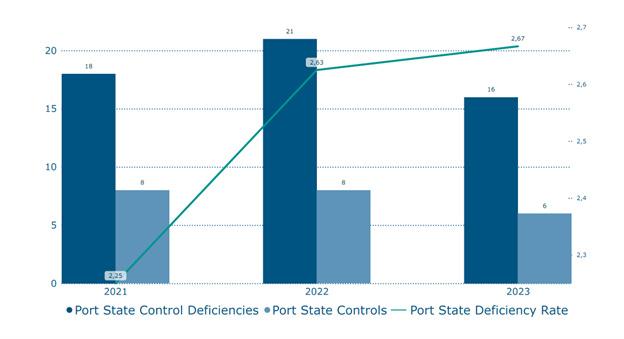
Non-conformance per audit is measured from port state control, authority, and class audits. We have a goal of one deficiency per audit; however, over the last years, we have yet to reach this target despite the extra focus on corrective actions as part of closing audit findings.
The work with corrective actions will continue to achieve the goal.
Code of conduct
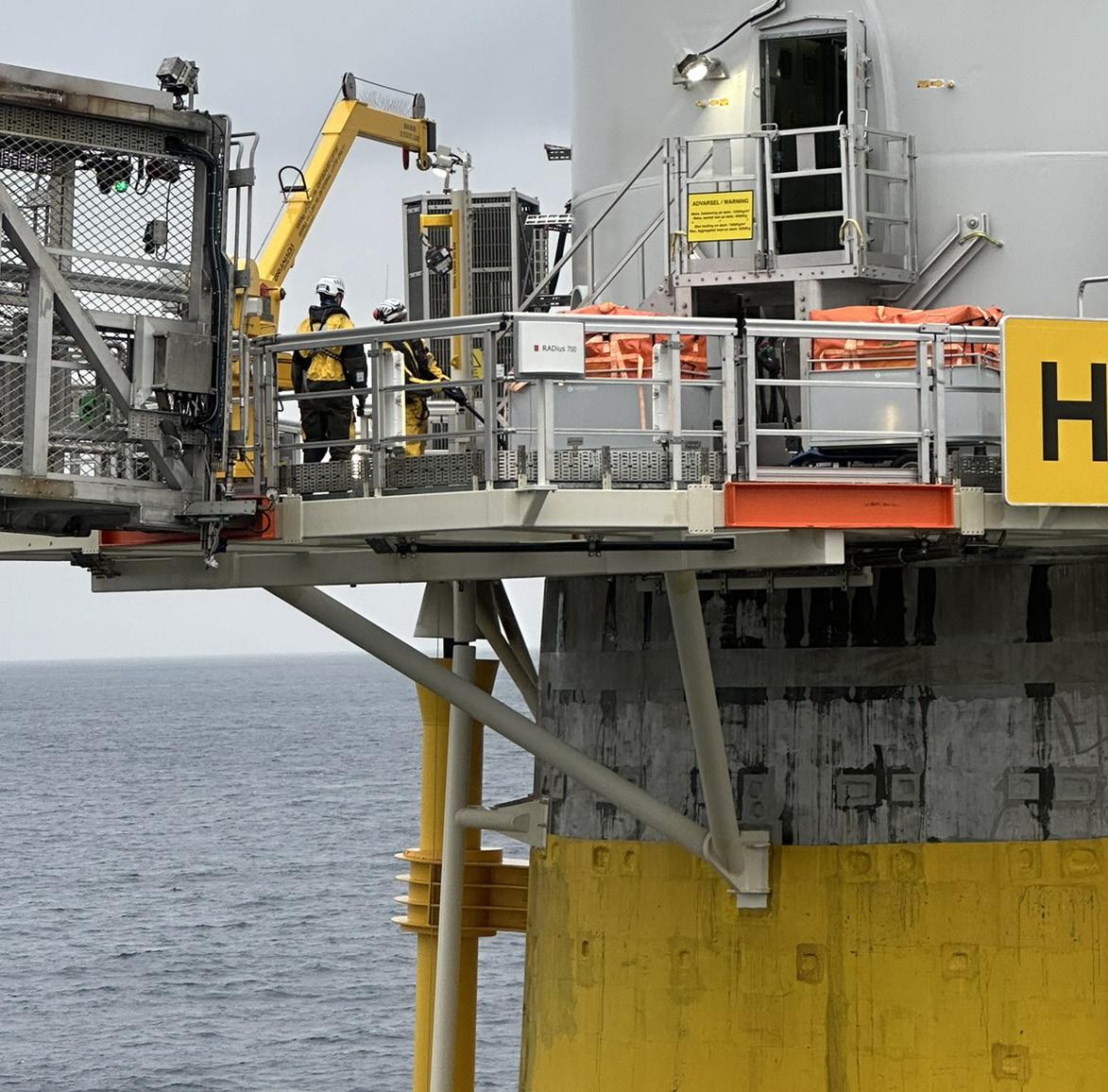
All employees are committed to ensure that all stakeholders receive the necessary attention and recognition. We shall treat one another with openness, respect and honesty and make sure all parties comply with our high ethical standards and code of conduct.

The Island Offshore code of conduct requires its owners, board of directors, management and employees to observe high standards of business and personal ethics in the conduct of their duties and responsibilities. Management and employees must practice honesty and integrity in every aspect in dealing with other Island Offshore employees, the public, the business community, shareholders, customers, suppliers, competitors and government authorities.
When acting on behalf of Island Offshore, management and employees shall not take unfair advantage through manipulation, concealment, abuse of privileged information, misrepresentation of material facts, or other unfair dealing practices. The Island Offshore code of conduct prohibits unlawful discrimination against employees, shareholders, management, customers and suppliers on account of ethnic or national origin, age, sex or religion. Respect for the individual is the cornerstone of the Island Offshore code of conduct. All persons shall be treated with dignity and respect and they shall not be unreasonably interfered with in the conduct of their duties and responsibilities.
No employee should be misguided by any sense of loyalty to Island Offshore or a desire for profitability that might cause him or her to disobey any applicable law or Island Offshore policy. Violation of the Island Offshore code of conduct will constitute grounds for disciplinary action, including when appropriate, termination of employment.
Island Offshore has based its principles on the OECD guidelines for multilateral enterprises, which give an extensive overview of rules to follow. See www.fifoost.org and the UN Convention on the Rights of the Child www.unicef.org/rightsite/index.html
Correspondingly, Island Offshore will promote the International Labor Organisation (ILO) fundamental principles and rights at work. These principles and rights are the right to freedom of association and the elimination of child labor, forced labor and discrimination linked to employment. See www.ilo.org
Photos:
Stig Silden: Frontpage, 8, 12, 14, 27, 32,
Marianne Hovden: 3, 22 ,34
Simen Hansen: 4
Ketil Næss: 10
Island Champion: 21
Island Wellserver: 23
Island Vanguard: 24
Island Pride: 29
Roar Skjeret: 31
